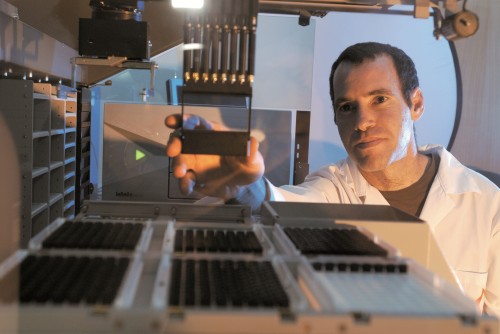Psoriasis is an autoimmune disease that affects millions of people and causes great suffering, costing billions of dollars to healthcare systems worldwide.

Researchers from Ben-Gurion University of the Negev, in collaboration with researchers from Teva, have developed an improved version of the immune system receptor as an experimental drug to treat psoriasis.
Psoriasis is an autoimmune disease that affects millions of people and causes great suffering, costing billions of dollars to healthcare systems worldwide. The main reason for the outbreak of the disease is a disturbance in the natural balance between signals of the immune system that inhibit inflammation versus signals that promote inflammation. In psoriasis, the result of the aforementioned imbalance is an inflammatory outbreak accompanied by an uncontrolled division of skin cells.
One of the signals involved in psoriasis outbreaks is interleukin 17. In an article published this month (February 2013) in the scientific journal Chemistry and Biology, Dr. Mariana Zaritsky, and Professor Amir Aharoni from Ben-Gurion University and the National Institute of Biotechnology (NIBN) next to the university, in collaboration with Dr. Liora Tavron, Dr. Yoel Kay and Roital Etzioni from Teva Company, developed a new method to inhibit inflammatory signals of interleukin 17. The group developed a genetically engineered receptor for interleukin 17 that can bind with a very high affinity the natural interleukin 17 found in patients. The engineered receptor was developed using a method called directed evolution, in which a collection of mutant receptors is tested in the laboratory to find an improved mutant.
The improved properties of the engineered receptor developed in Prof. Aharoni's laboratory means that it can be used as a promising experimental drug for psoriasis. Indeed, in the published scientific article, the group showed that this receptor is highly effective in lowering inflammatory markers caused by high levels of interleukin 17. Furthermore, injection of the engineered receptor into a mouse model of the human psoriasis disease, led to a dramatic decrease in the symptoms of the disease, a clear marker for curing the disease in this model .
Prof. Aharoni adds: "We developed the method for the in vitro evolution of the interleukin 17 receptor to treat patients with severe psoriasis who do not respond to the currently available treatments and the initial results are promising. The method developed in my laboratory can be adapted to the development of additional receptors such as those found in the immune system or involved in cancer. I believe that the in vitro evolution method of receptors has great potential."
It should be noted that Prof. Amir Aharoni, a researcher in the Department of Life Sciences as well as in the National Institute of Biotechnology next to the university, recently won a grant on behalf of a new and unique program within the IDEAS-ERC (Europe Research Council) project on behalf of the European Union, one of whose tracks is intended for young researchers. The program emphasizes innovation, the high level of risk and the ability to lead and lead in the field and enable the winning researcher to be a leader in the field in Europe.
Dr. Aharoni's research focuses on creating proteins with new properties through the use of an advanced method called "directed evolution". This method is based on the creation of genetic variation through the creation of a collection of genes containing many mutations, which is tested and scanned to isolate proteins with improved properties. This selection process carried out in the laboratory imitates Darwinian evolution, based on the principle of "survival of the fittest". Using this method, the natural evolutionary process leading to the creation of proteins with new properties can be accelerated, therefore the method is called directed evolution."

6 תגובות
Well done to Amir and the whole team, I really hope you will update from time to time
in development and give us some hope
I would be happy to know a little more and if there is already a treatment that can be received and tried :-)
Go up and succeed. I wish there was a cure for this annoying disease, but is it possible to join the treatment group?
Well done - how can I get into the drug trial group?
Well done, I would be very happy to pass the experiment on me
Well done!!!!!